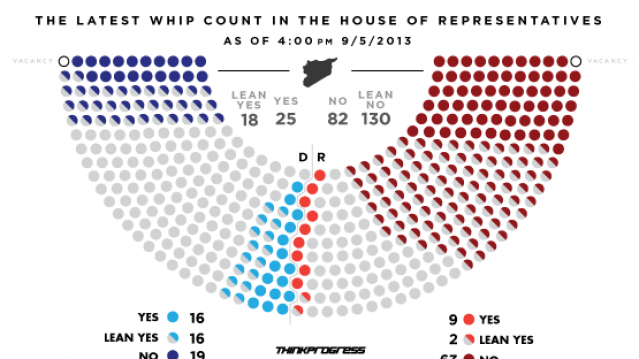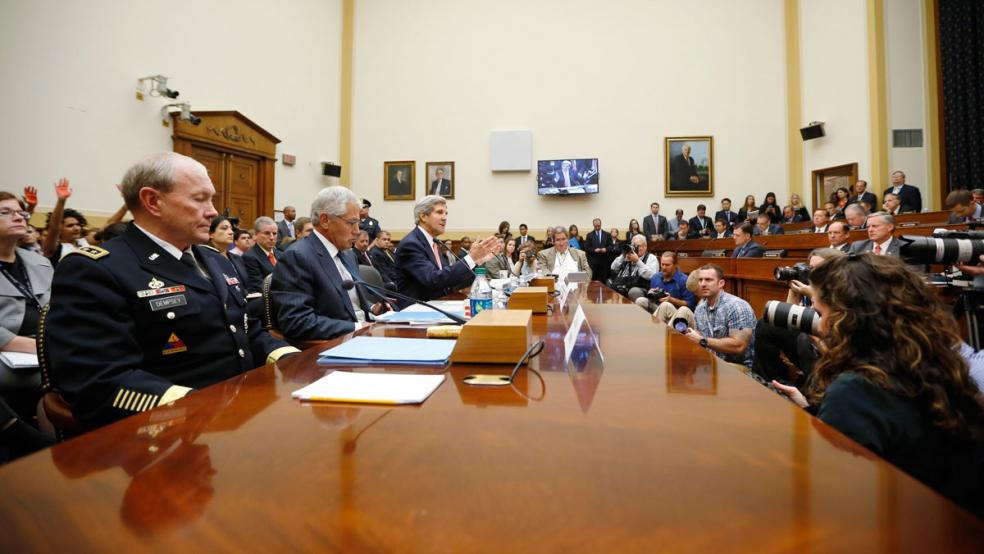The debate over bombing Syria has exposed a deep fault line among Republicans in Congress, with the strong possibility that a majority of them will vote against it in both the House and Senate. But this is just one of many fault lines that threaten GOP control of the House and chances of regaining a Senate majority and the White House in 2016.
Republicans were virtually united during the George W. Bush years on the need for military intervention, even war, in places like Iraq and Afghanistan. The need to protect the world from weapons of mass destruction, protect a major source of our oil supply, and protect our ally, Israel, overcame any doubts they may have had about the cost in terms of lives and treasure.
RELATED: HOW THE SYRIA CRISIS IS SHAPING THE 2016 CAMPAIGN
To be sure, there was always a small but vocal group of Republicans opposed to war, led by former Rep. Ron Paul of Texas. But their ranks are now much larger with the election of many members of the Tea Party since 2010. They are deeply skeptical of all government actions, including by the military.
These Tea Party members are heirs to a conservative non-interventionist tradition dating back to the American First Committee that tried to keep the U.S. out of World War II until the Japanese attack on Dec. 7, 1941. During the Cold War, conservatives’ anticommunism overcame their doubts about military intervention in far-flung places such as Korea and Vietnam.
But since collapse of the Soviet Union, conservative anti-interventionism has enjoyed a renaissance that was only temporarily derailed by the attacks of 9/11. Now, after a decade of seemingly fruitless war that has done nothing to make Americans feel safer from external attack, the skeptics now represent a very considerable bloc of Republicans in Congress, let by Rep. Paul’s son, Sen. Rand Paul of Kentucky.
The Paul bloc is, of course, aided enormously by the fact that the drive for intervention is Syria is being led by Democrat Barack Obama. But this is not really a partisan issue, since many Republicans and conservative leaders support Obama on this one.
Aiding the Republican skeptics are revelations of widespread government spying on the communications of American citizens through the National Security Agency, and the common belief among conservatives that they have been targeted for scrutiny by the Internal Revenue Service.
Personally, I don’t see how a majority of Republicans in the House of Representatives can be persuaded to vote for military action in Syria. With a substantial number of Democrats also likely to defect from Obama and the Democratic leadership, I think congressional support for a resolution giving him support for action is well less than 50-50.
Syria-Whip-Count-graphic_jpg.png

But Syria is not the only issue on which there is substantial cleavage among Republicans. Immigration reform, raising the debt limit, defunding the Affordable Care Act and completing action on the 2014 budget before the new fiscal year starts on October 1 are others where there is a growing divide between Republican leaders and the Tea Party crowd.
Adding to the leaders’ woes are unrelenting attacks on them in primaries, where Tea Party members have successfully rejected incumbent senators Bob Bennett of Utah and Dick Lugar of Indiana. Senate Minority Leader Mitch McConnell of Kentucky is now under severe attack from the right for allegedly dragging his feet on defunding health reform.
RELATED: OBAMA TO RALLY SUPPORT FOR SYRIA STRIKE AT G-20 MEETING
Fending off right wing assault also appears to be taking its toll on House Speaker John Boehner of Ohio, who is widely rumored to have decided to step down next year.
At the same time, there are signs that some of the GOP’s big donors have tired of the Tea Party’s obsession with Quixotic goals and inattention to Congress’s basic work of getting budgets passed and giving businesses some degree of policy certainty.
The GOP’s corporate allies are also becoming frustrated with the party’s gridlock. Businesses would very much like immigration reform, but it appears to be slipping away as hardliners pressure Republicans in the House to demand impossible conditions for enactment.
Lastly, there is a continuing problem for Republicans in recruiting candidates who can win statewide elections in competitive states. Easily winnable senate races in Delaware, Missouri, Nevada, Indiana and Colorado were thrown away by the insistence of Republican primary voters of nominating candidates who were widely viewed as kooks.
It is happening again in Virginia, where it appears almost certain that Republicans will lose the governorship because its nominees for governor and lieutenant governor insist upon talking about divisive social issues, such as outlawing sodomy, rather than sticking to bread-and-butter issue such as business development, transportation, taxes and others that voters care about.
It is too soon to say whether the GOP will fracture sufficiently to give Democrats control of the House next year—the benefits of incumbency and gerrymandering are probably sufficient to maintain Republican control unless the party commits seppuku by defeating people like McConnell in the primaries.
But it’s clear that these fractures will make winning the White House extremely difficult in 2016. Many Republican primary voters truly believe that the only reason John McCain lost in 2008 and Mitt Romney lost in 2012 is because they are squishy moderates. A real, hardcore conservative would have won, they maintain.
I think this is insane, but with no obvious “establishment” candidate for president, it is quite possible that the nomination could be won by former senator Rick Santorum, who will receive strong support from the religious right and others who believe that moral degeneration is the nation’s biggest problem.
The establishment may conclude that its best long-term strategy is to let the kooks have their shot, have the party go down to a historic defeat, and put the pieces back together again after the election with all the extremists purged. That is what happened in 1964, which led to Republican victory in 1968.
Given that the Democrats are almost certain to nominate Hillary Clinton, a very formidable candidate that even a strong Republican would have great difficulty beating, the case for Republican elites talking a pass on 2016 becomes overwhelming.






